Key takeaways:
- Ocean conservation is vital for both ecological health and human survival, highlighting our responsibility to protect marine ecosystems.
- Reef volunteers significantly contribute to coral restoration and inspire community engagement through shared experiences and collective action.
- Volunteering fosters deep emotional connections to marine life and enhances awareness about the challenges faced by marine ecosystems.
- Physical and emotional challenges during volunteering underscore the importance of collaboration and resilience in conservation efforts.

Understanding Ocean Conservation
Ocean conservation is crucial for preserving the intricate ecosystems that support life on our planet. I remember witnessing a vibrant coral reef during my first dive—an explosion of colors and life. It struck me how delicate these ecosystems are and how easily they can be harmed by pollution and climate change. How can we hope to enjoy the ocean’s beauty if we don’t actively protect it?
The reality is that oceans cover about 70% of the Earth’s surface, yet they often go unnoticed in conversations about conservation. I often find myself wondering why that is. When I participated in beach clean-ups, the sheer volume of plastic waste on the shore was shocking. It became clear to me that every piece of plastic represents a breach in our responsibility to the ocean. What legacy do we leave behind if we neglect to act?
The interconnectedness of ocean health and human survival is another aspect that fascinates me. The ocean not only generates over half of the oxygen we breathe but also supports countless livelihoods. Each time I reflect on the fishermen I’ve met, struggling to catch dwindling fish populations, it amplifies my understanding of how vital sustainable practices are. How can we ignore this crucial relationship between our actions and the ocean’s well-being?
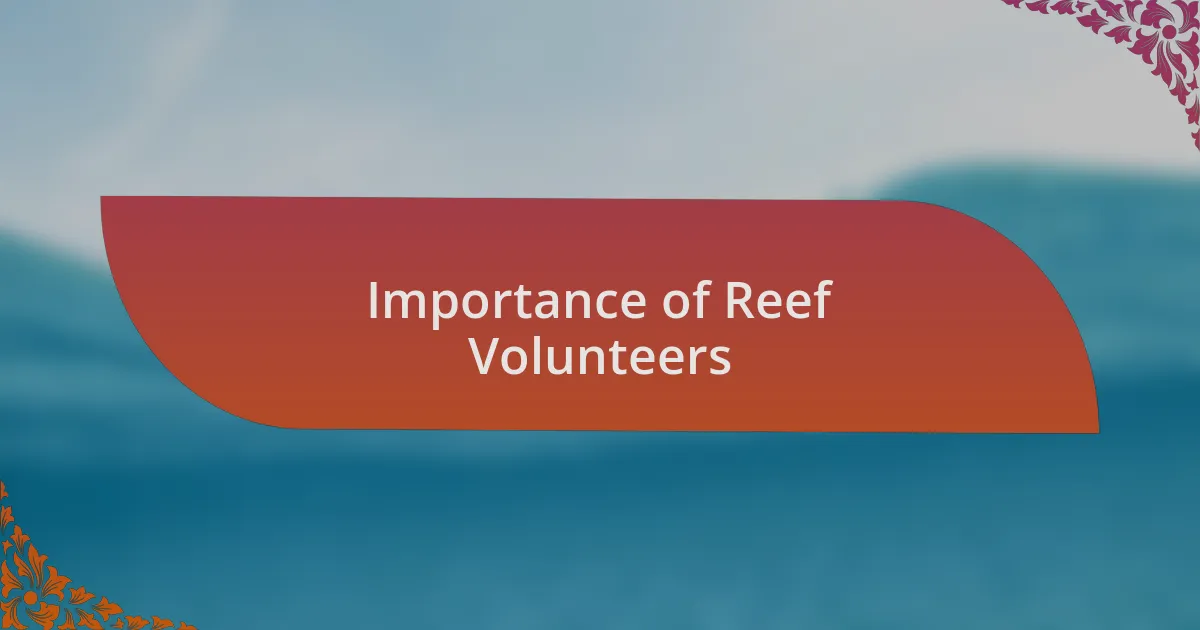
Importance of Reef Volunteers
Reef volunteers play a pivotal role in the health and restoration of coral ecosystems. I remember my first day on a reef restoration project, carefully planting coral fragments while the sun glinted off the water. It was a humbling experience that emphasized how individual efforts contribute to a larger purpose—every fragment nurtured is a step toward revitalizing a delicate habitat.
The passion and dedication of reef volunteers can inspire entire communities to engage in conservation efforts. I felt a surge of pride as I joined a diverse group of participants, each bringing unique expertise and enthusiasm. It made me realize that when people unite for a common cause, they create a ripple effect that extends beyond the reef. How can we underestimate the power of collective action in addressing the challenges our oceans face?
Moreover, reef volunteers often become ambassadors for ocean conservation. After spending countless hours underwater, I found that sharing my experiences fueled conversations about marine health with friends and family. These discussions can spark curiosity and urge others to think critically about their impact on the ocean. Isn’t it fascinating how personal stories can turn into advocacy? Each encounter has the potential to inspire others to take responsibility for our shared marine environment.
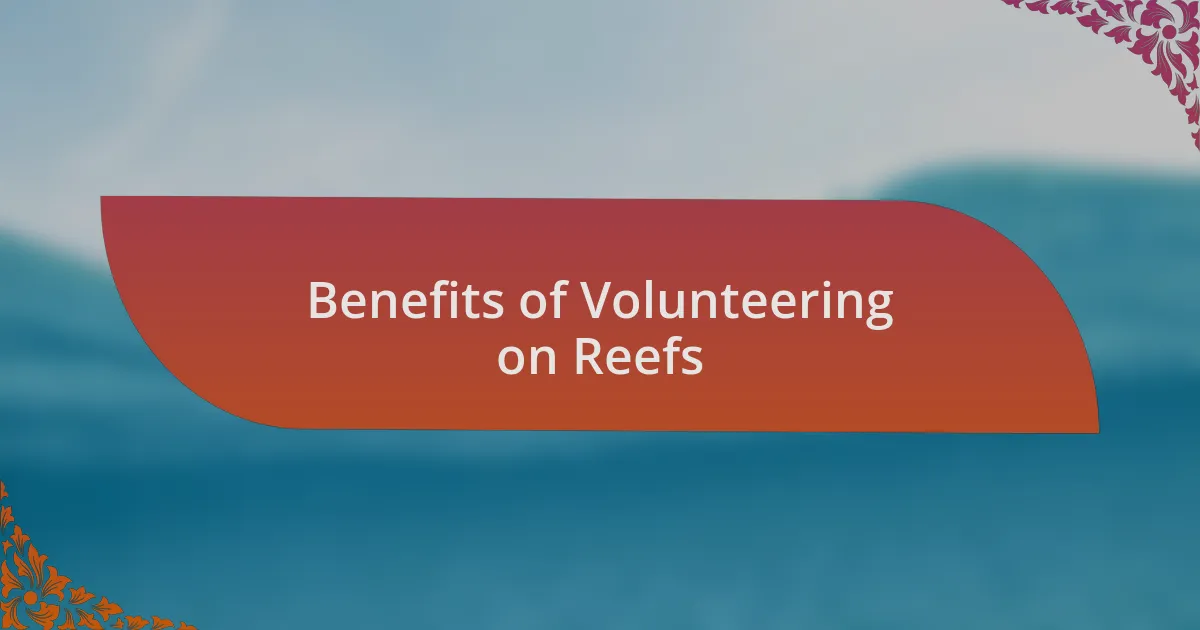
Benefits of Volunteering on Reefs
Volunteering on reefs offers a unique opportunity to connect with nature on an intimate level. I remember the vibrant colors of the corals and the delicate dance of fish around me during my dives—it was like stepping into a living painting. This deep connection fosters a profound appreciation for marine life, and I found myself more motivated than ever to advocate for ocean health.
One of the most rewarding aspects of reef volunteering is the knowledge gained through hands-on experience. During a workshop on marine biology, I learned about coral bleaching and its causes. Understanding these concepts firsthand made the challenges our reefs face feel personal. How can we care for what we don’t fully understand? By diving deep into the science, volunteers emerge better equipped to educate others and spread awareness.
Additionally, the friendships forged while working side by side are invaluable. I recall bonding with fellow volunteers after long days of restoration, sharing meals and stories under the stars. Those connections not only enhance the experience but also create a supportive network dedicated to ongoing conservation efforts. Isn’t it remarkable how working toward a common goal can transform strangers into lifelong friends, united by a shared passion for protecting our oceans?
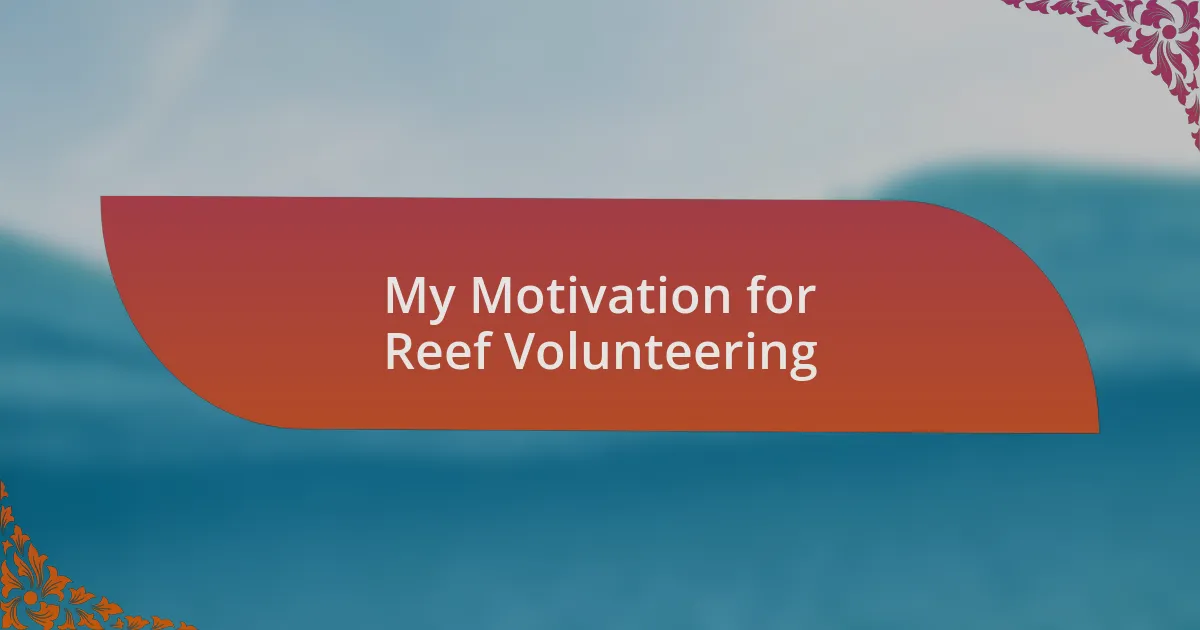
My Motivation for Reef Volunteering
Volunteering on reefs became a calling for me the moment I realized the fragility of these ecosystems. I recall standing in the shallows, watching coral polyps retract, grasping the reality that their survival depends on both individual actions and collective efforts. This realization sparked an urgent desire within me to contribute directly to their preservation. How could I stand idly by while they faced threats like pollution and climate change?
The thrill of diving into the unknown also fueled my motivation. Each plunge into the azure depths introduced me to a new realm of biodiversity, where every species played a role in the intricate web of life. I remember the first time I caught a glimpse of a hawksbill turtle gliding gracefully past me—it was a moment of pure magic that solidified my commitment to protect their habitat. Isn’t it striking how such beauty can ignite a fire in our hearts for conservation?
Finally, I felt a personal responsibility towards future generations. Reflecting back on my childhood trips to the beach, I often wonder what the ocean will look like for my own children. This thought became a driving force behind my volunteering. To think about what might be lost if we don’t act now is both sobering and motivating. I want to ensure that they can experience the same awe and wonder that the ocean instilled in me.
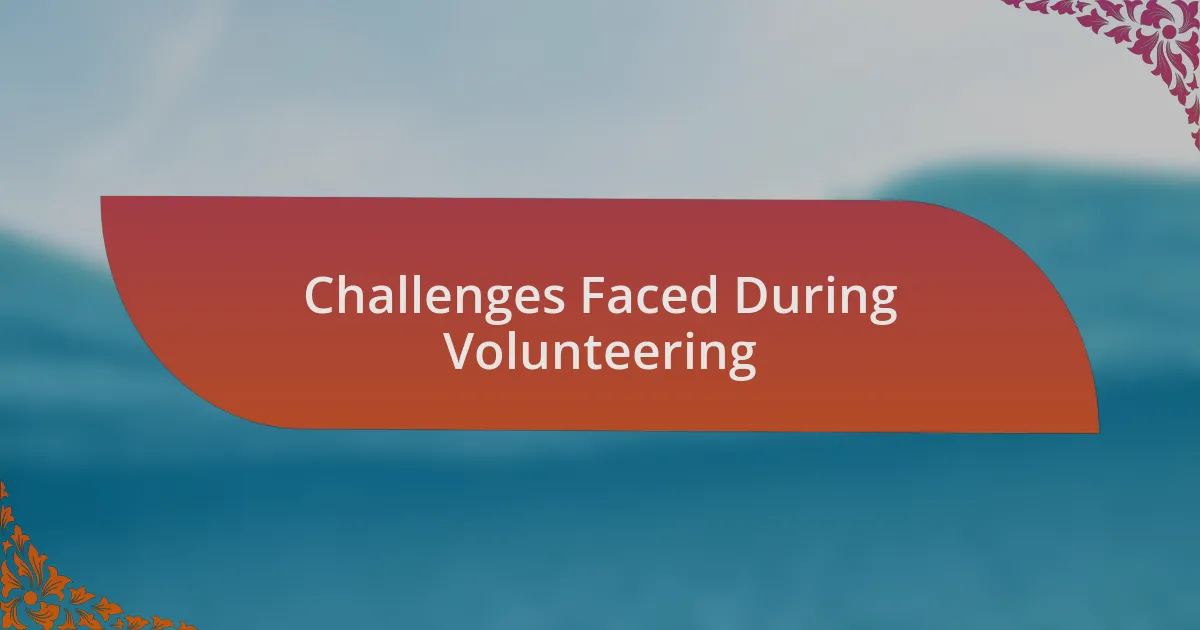
Challenges Faced During Volunteering
While volunteering on the reef, I quickly discovered that the physical demands were no small feat. Some days, I spent hours battling against strong currents, which left me feeling exhausted and drained. I often found myself asking, “Is this worth it?” Yet, each time I saw the vibrant colors of the coral dancing in the water, I felt rejuvenated, reminded of the purpose behind the struggle.
Adapting to the emotional challenges was equally significant. I vividly remember witnessing the impact of coral bleaching firsthand. It was disheartening to see once-thriving ecosystems reduced to ghostly outlines of their former selves. How could such vibrant life dwindle so quickly? It was moments like these that weighed heavily on my heart, fueling both my sadness and my determination to fight for change.
In addition to physical and emotional strains, navigating group dynamics posed its own set of challenges. Each volunteer came with different levels of experience and perspectives, which sometimes led to conflicts. I found myself reflecting on how vital collaboration is in conservation efforts. It reminded me that, while passion is crucial, forging a united front often requires patience and understanding among teammates.
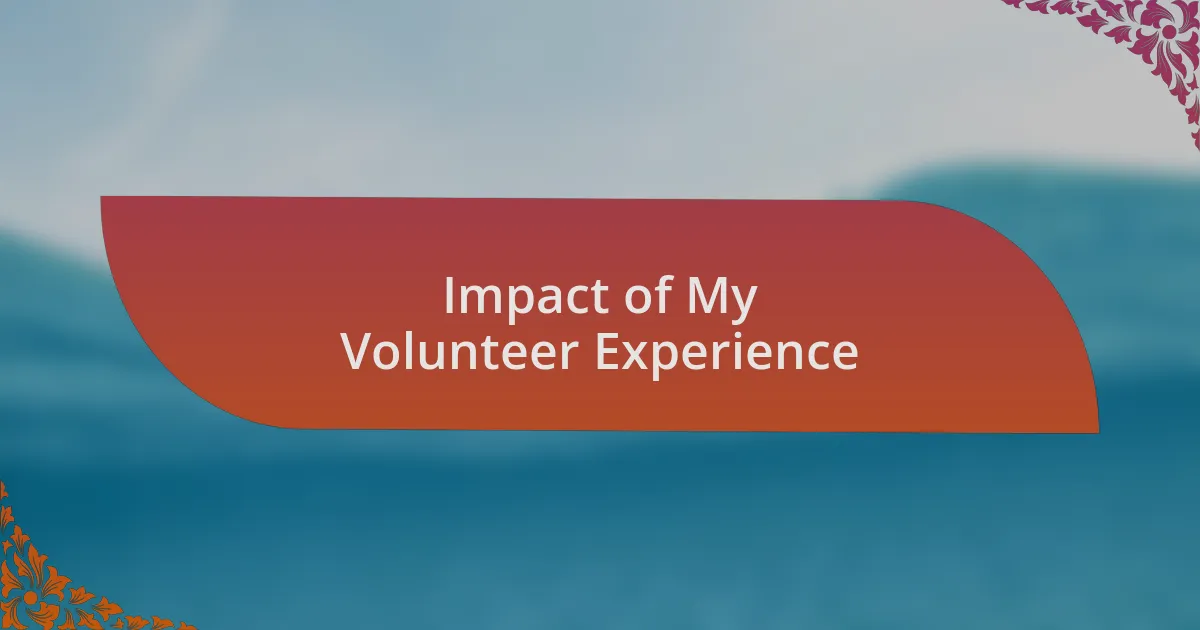
Impact of My Volunteer Experience
The experience of volunteering on the reef transformed my perspective on ocean conservation in unexpected ways. I recall a day when we conducted a coral restoration project, carefully cementing new coral fragments to the seabed. In that moment, I realized that every small action truly contributes to a larger goal. How could such simple efforts make such a significant impact? The answer lies in the collective energy and dedication of each volunteer working for a shared cause.
One of the most profound impacts of my experience was developing a deeper emotional connection to marine life. During a dive, I spotted a solitary clownfish peeking out from its anemone, and I was struck by the fragility of its habitat. This interaction ignited within me a sense of urgency—what if that little fish lost its home? Knowing that my efforts could help restore such environments became a driving force in my conservation journey.
Volunteering also opened my eyes to the power of storytelling in advocacy. I vividly remember sharing our experiences with local communities, highlighting both our challenges and successes. Each story resonated differently; some listeners were moved to take action in their own lives. How could sharing my journey inspire others? Reflecting on these moments, I understood that our voices are powerful tools for change, capable of inspiring people far beyond the reefs we cherish.